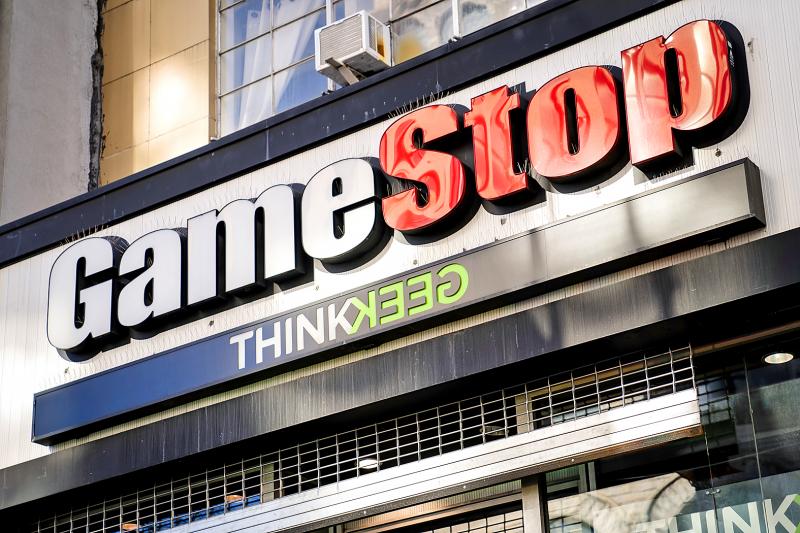GameStop Corp plans to launch a marketplace for nonfungible tokens (NFT) for gamers by the end of the year, a person familiar with the matter said, sending shares of the gaming retailer soaring in extended trading.
The company, which is in the middle of a turnaround to focus on digital sales rather than brick-and-mortar shops, is also in talks with crypto and blockchain companies about which tokens could be used on the NFT marketplace, the person said, asking not to be named.
It is also discussing with partners the potential to create funds of up to US$100 million each to invest in NFT content creators and gaming companies, the person said.

Photo: AP
Over the past few months, GameStop has assembled a team of more than 20 people who are focused on the crypto-related push, the person said.
The Wall Street Journal earlier reported on GameStop’s crypto and NFT plans.
The shares jumped 29 percent in extended trading.
Investors have been waiting for months to hear more about the firm’s strategy from GameStop chairman Ryan Cohen, a cofounder of pet supply company Chewy Inc, who joined the board earlier this year with a vision to revive growth.
The Texas-based company suffered in the shift from gaming cartridges to digital downloads, and was further battered by the COVID-19 pandemic, which shuttered retail shops.
However, it has been championed by retail investors who organize in online forums such as Reddit, and boosted the stock by almost 700 percent last year, despite little fundamental evidence to support the gains.
The company has posted years of annual revenue declines.
The largest market for NFTs, OpenSea, saw an explosion in sales last year, with monthly sales volume peaking at US$3.4 billion in August, up from US$96.7 million in February, Dune Analytics data showed.
The company makes money by taking a 2.5 percent cut of every transaction.
Seeing this traction, a slew of other NFT marketplaces have sprung up in recent months, hoping to attract users.
GameStop has millions of loyal gaming customers whom it can direct to its marketplace.

KEEPING UP: The acquisition of a cleanroom in Taiwan would enable Micron to increase production in a market where demand continues to outpace supply, a Micron official said Micron Technology Inc has signed a letter of intent to buy a fabrication site in Taiwan from Powerchip Semiconductor Manufacturing Corp (力積電) for US$1.8 billion to expand its production of memory chips. Micron would take control of the P5 site in Miaoli County’s Tongluo Township (銅鑼) and plans to ramp up DRAM production in phases after the transaction closes in the second quarter, the company said in a statement on Saturday. The acquisition includes an existing 12 inch fab cleanroom of 27,871m2 and would further position Micron to address growing global demand for memory solutions, the company said. Micron expects the transaction to

Vincent Wei led fellow Singaporean farmers around an empty Malaysian plot, laying out plans for a greenhouse and rows of leafy vegetables. What he pitched was not just space for crops, but a lifeline for growers struggling to make ends meet in a city-state with high prices and little vacant land. The future agriculture hub is part of a joint special economic zone launched last year by the two neighbors, expected to cost US$123 million and produce 10,000 tonnes of fresh produce annually. It is attracting Singaporean farmers with promises of cheaper land, labor and energy just over the border.

US actor Matthew McConaughey has filed recordings of his image and voice with US patent authorities to protect them from unauthorized usage by artificial intelligence (AI) platforms, a representative said earlier this week. Several video clips and audio recordings were registered by the commercial arm of the Just Keep Livin’ Foundation, a non-profit created by the Oscar-winning actor and his wife, Camila, according to the US Patent and Trademark Office database. Many artists are increasingly concerned about the uncontrolled use of their image via generative AI since the rollout of ChatGPT and other AI-powered tools. Several US states have adopted

A proposed billionaires’ tax in California has ignited a political uproar in Silicon Valley, with tech titans threatening to leave the state while California Governor Gavin Newsom of the Democratic Party maneuvers to defeat a levy that he fears would lead to an exodus of wealth. A technology mecca, California has more billionaires than any other US state — a few hundred, by some estimates. About half its personal income tax revenue, a financial backbone in the nearly US$350 billion budget, comes from the top 1 percent of earners. A large healthcare union is attempting to place a proposal before